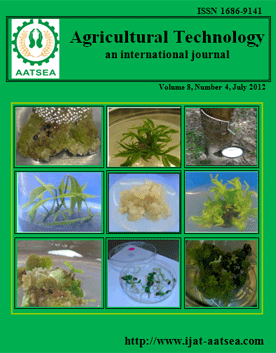ThaiScience
ThaiScience
INTERNATIONAL JOURNAL OF AGRICULTURAL TECHNOLOGY
Volume 15, No. 05, Month SEPTEMBER, Year 2019, Pages 693 - 706
Pioneering commercialization of certified cassava seed production: impacts on sustainable cassava production, income and wealth creation in uganda
Awio, T., Alacho, F., Otim-Nape, G. W., Ijala, T., Ogwang, S. B., Aseere, G., Okello, G. and Akullu, A.
Abstract Download PDF
Cassava is one of the most important food crops and sources of income for Uganda’s smallholder farmers. However, yields are low due to diseases like cassava brown streak and cassava mosaic, poor quality of planting materials used and declining soil fertility, among other factors. To address the challenge of poor quality planting materials, a program aimed at establishing a functional cassava seed system to monitor production and marketing of certified cassava seed was implemented. This study evaluated the impacts of this intervention on certified cassava seed multipliers and sellers (CSEs) and smallholder farmers (SHFs) in Uganda. A survey was conducted to assess the benefits of inspection and certification to CSEs, CSEs willingness to pay for inspection and certification services, farmers’ access status to clean planting materials of improved cassava varieties, and farmers’ yields and income. Majority of CSEs (74%) reported planting, production and marketing of high-quality planting materials as main benefit of inspection and certification, followed by improved knowledge on cassava crop management (67%), and better prices for certified planting materials (56%). A bigger proportion of CSEs (63%) reported the willingness to pay for inspection and certification costs, with majority (56%) willing to pay USD 11-20 per inspection. Forty percent of SHFs reported increased access to improved planting materials which was attributed to community-based cassava seed multiplication fields established by CSEs in the areas. Additionally, 80 and 47% of CSEs and SHFs, respectively, reported increased yields from planting clean planting materials, and this was associated with improved household income. The study shows positive impacts of the intervention towards creating a functional cassava seed system. However, farmers reported high costs for clean planting materials from CSEs. Therefore, to make the seed system efficient and sustainable, deliberate efforts should be made to ensure farmers affordably access planting materials for sustainable cassava production.
Keywords
Certified cassava seed, Cassava seed entrepreneurs, Smallholder farmers, Inspection and certification, Functional cassava seed system, Sustainable cassava productionINTERNATIONAL JOURNAL OF AGRICULTURAL TECHNOLOGY
Published by : Association of Agricultural Technology in Southeast Asia (AATSEA)
Contributions welcome at : http://www.ijat-aatsea.com
